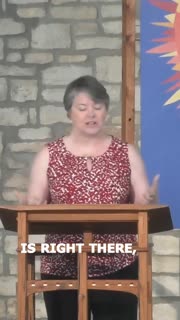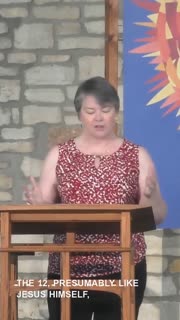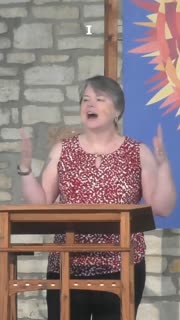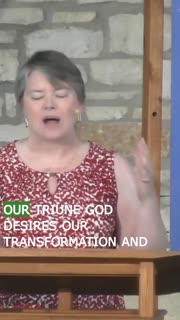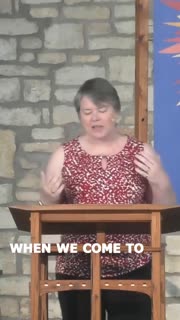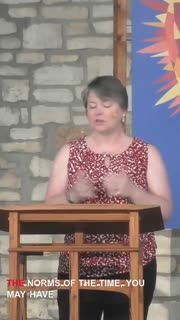Trust and Transformation: Embracing God's Authority Together
Summary
### Summary
Good morning, Shepherd of the Hills family. It’s a joy to be back with you and share what I’ve been up to in my theological journey. Today, we dive into the Gospel of Mark, chapter six, verses one through 13, where Jesus returns to his hometown, Nazareth, and faces skepticism from those who knew him as a carpenter. Despite his wisdom and miraculous deeds, the people of Nazareth are scandalized by his humble origins and refuse to trust his authority. This lack of trust hinders Jesus' ability to perform miracles among them.
The passage then shifts to Jesus sending out the twelve disciples in pairs, giving them authority over unclean spirits and instructing them to rely on the hospitality of those they visit. This act of sending the disciples expands Jesus' ministry, demonstrating that God's transformative power is not limited to Jesus alone but is meant to be carried forward by his followers. The disciples' success in casting out demons and healing the sick underscores the importance of trust and receptivity in experiencing God's restoration.
Trust is a recurring theme in this passage. The people of Nazareth miss out on Jesus' miracles due to their lack of trust, while the disciples, empowered by Jesus, bring about significant transformation because they are trusted and welcomed. This trust is not passive but an active participation in God's work, requiring us to open ourselves to new possibilities and transformations.
As we reflect on this passage, we are challenged to bring ourselves into the scriptures, to trust in God's authority, and to actively participate in the transformation God desires for us and the world. Whether we see ourselves as insiders or outsiders, our trust in God can lead to profound change and restoration.
### Key Takeaways
1. Trust as Active Participation: Trust in God is not a passive state but an active engagement. Just as the people of Nazareth missed out on Jesus' miracles due to their lack of trust, we too can miss out on God's work in our lives if we do not actively participate in it. Trust requires us to open ourselves to new possibilities and transformations. [07:50]
2. Authority and Transformation: Jesus' authority was questioned by those who knew him as a carpenter, yet he empowered his disciples to carry forward his work. This shows that God's transformative power is not limited to a single person but is meant to be shared and expanded through trust and receptivity. [10:05]
3. Hospitality and Trust: The disciples were instructed to rely on the hospitality of those they visited, creating a reciprocal space for trust. This mutual trust led to significant healing and transformation, highlighting the importance of welcoming and trusting those who bring God's message. [11:31]
4. Personal and Communal Transformation: The passage challenges us to see ourselves within the scriptures, to imagine how we might respond to Jesus' teachings and authority. This reflection can lead to personal and communal transformation, as we trust in God's work in our lives and communities. [16:17]
5. Embracing the Scriptures: We are encouraged to bring ourselves into the scriptures, to see them not as distant or outdated but as living words that can transform us. By actively engaging with the scriptures, we become agents of God's healing and restoration in the world. [20:37]
### Youtube Chapters
[0:00] - Welcome
[00:49] - Introduction and Personal Update
[02:18] - Introduction to the Sermon Series
[02:59] - Reading from the Gospel of Mark
[05:04] - Jesus in Nazareth: Skepticism and Unbelief
[07:50] - The Role of Trust in Transformation
[10:05] - Jesus Sends Out the Twelve Disciples
[11:31] - Hospitality and Trust in Ministry
[16:17] - Personal Reflection and Application
[20:37] - Embracing the Scriptures for Transformation
[22:12] - Closing Prayer and Lord's Prayer
Study Guide
### Bible Reading
- Mark 6:1-13
### Observation Questions
1. What was the reaction of the people of Nazareth to Jesus' teachings and miracles? ([03:44])
2. How did Jesus respond to the skepticism and unbelief of the people in his hometown? ([03:44])
3. What instructions did Jesus give to the twelve disciples when he sent them out in pairs? ([04:26])
4. What were the results of the disciples' mission as they went out to preach and heal? ([04:26])
### Interpretation Questions
1. Why do you think the people of Nazareth were scandalized by Jesus' humble origins and refused to trust his authority? ([05:40])
2. How does the concept of trust as active participation play a role in the miracles and teachings of Jesus? ([07:50])
3. In what ways does the sending out of the twelve disciples demonstrate the expansion of Jesus' ministry and authority? ([10:05])
4. How does the reliance on hospitality by the disciples create a reciprocal space for trust and transformation? ([11:31])
### Application Questions
1. Reflecting on the skepticism of the people of Nazareth, have you ever found it difficult to trust someone because of their background or origins? How did that affect your relationship with them? ([05:40])
2. Jesus' ability to perform miracles was hindered by the lack of trust in Nazareth. Are there areas in your life where a lack of trust might be hindering God's work? ([07:06])
3. The disciples were sent out with minimal provisions, relying on the hospitality of others. How can you practice trust and reliance on God's provision in your daily life? ([04:26])
4. The success of the disciples' mission was partly due to the trust and welcome they received. How can you create a welcoming and trusting environment in your community or church? ([11:31])
5. The sermon challenges us to actively participate in God's work. What are some practical steps you can take to engage more actively in your faith and community? ([07:50])
6. Reflect on a time when you felt like an outsider. How did that experience shape your understanding of trust and hospitality? ([12:57])
7. The sermon encourages us to bring ourselves into the scriptures. How can you make your Bible reading more interactive and transformative? ([20:37])
Devotional
Day 1: Trust as Active Participation
Trust in God is not a passive state but an active engagement. Just as the people of Nazareth missed out on Jesus' miracles due to their lack of trust, we too can miss out on God's work in our lives if we do not actively participate in it. Trust requires us to open ourselves to new possibilities and transformations. The people of Nazareth were scandalized by Jesus' humble origins and refused to trust his authority, which hindered his ability to perform miracles among them. This lack of trust serves as a cautionary tale for us today.
In contrast, the disciples, empowered by Jesus, brought about significant transformation because they were trusted and welcomed. Their success in casting out demons and healing the sick underscores the importance of trust and receptivity in experiencing God's restoration. Trust is not merely believing in God's power but actively engaging with it, allowing it to transform our lives and the lives of those around us. [07:50]
Mark 6:5-6 (ESV): "And he could do no mighty work there, except that he laid his hands on a few sick people and healed them. And he marveled because of their unbelief. And he went about among the villages teaching."
Reflection: Think of an area in your life where you have been hesitant to trust God fully. What steps can you take today to actively engage with God's transformative power in that area?
Day 2: Authority and Transformation
Jesus' authority was questioned by those who knew him as a carpenter, yet he empowered his disciples to carry forward his work. This shows that God's transformative power is not limited to a single person but is meant to be shared and expanded through trust and receptivity. The people of Nazareth could not see beyond Jesus' humble beginnings, and their skepticism prevented them from experiencing the fullness of his miracles.
However, Jesus did not let this skepticism hinder his mission. He sent out the twelve disciples in pairs, giving them authority over unclean spirits and instructing them to rely on the hospitality of those they visited. This act of sending the disciples expanded Jesus' ministry, demonstrating that God's transformative power is meant to be carried forward by his followers. The disciples' success in casting out demons and healing the sick underscores the importance of trust and receptivity in experiencing God's restoration. [10:05]
Mark 6:7 (ESV): "And he called the twelve and began to send them out two by two, and gave them authority over the unclean spirits."
Reflection: Reflect on a time when you questioned someone's authority based on their background or appearance. How can you open yourself to recognizing and accepting God's transformative power in unexpected places and people?
Day 3: Hospitality and Trust
The disciples were instructed to rely on the hospitality of those they visited, creating a reciprocal space for trust. This mutual trust led to significant healing and transformation, highlighting the importance of welcoming and trusting those who bring God's message. Jesus' instructions to the disciples emphasized the importance of community and mutual support in ministry.
By relying on the hospitality of others, the disciples created opportunities for trust and receptivity, which in turn facilitated healing and transformation. This reciprocal relationship underscores the importance of welcoming and trusting those who bring God's message, as well as being open to the ways in which God can work through others. The disciples' success in their mission demonstrates the power of mutual trust and hospitality in experiencing God's restoration. [11:31]
Mark 6:10-11 (ESV): "And he said to them, 'Whenever you enter a house, stay there until you depart from there. And if any place will not receive you and they will not listen to you, when you leave, shake off the dust that is on your feet as a testimony against them.'"
Reflection: Think of someone in your life who has brought you a message of God's love or truth. How can you show hospitality and trust to them today, creating a space for mutual transformation?
Day 4: Personal and Communal Transformation
The passage challenges us to see ourselves within the scriptures, to imagine how we might respond to Jesus' teachings and authority. This reflection can lead to personal and communal transformation, as we trust in God's work in our lives and communities. By placing ourselves in the narrative, we can better understand the dynamics of trust, authority, and transformation that Jesus exemplifies.
As we reflect on this passage, we are encouraged to bring ourselves into the scriptures, to see them not as distant or outdated but as living words that can transform us. This active engagement with the scriptures allows us to become agents of God's healing and restoration in the world. Whether we see ourselves as insiders or outsiders, our trust in God can lead to profound change and restoration. [16:17]
Mark 6:12-13 (ESV): "So they went out and proclaimed that people should repent. And they cast out many demons and anointed with oil many who were sick and healed them."
Reflection: Reflect on a specific teaching of Jesus that challenges you. How can you actively apply this teaching in your life today to bring about personal and communal transformation?
Day 5: Embracing the Scriptures
We are encouraged to bring ourselves into the scriptures, to see them not as distant or outdated but as living words that can transform us. By actively engaging with the scriptures, we become agents of God's healing and restoration in the world. The scriptures are not just historical texts but living words that speak to our current circumstances and challenges.
As we embrace the scriptures, we are invited to see ourselves within the narrative, to imagine how we might respond to Jesus' teachings and authority. This active engagement allows us to experience the transformative power of God's word in our lives and communities. By trusting in God's work through the scriptures, we can become agents of healing and restoration in the world. [20:37]
Hebrews 4:12 (ESV): "For the word of God is living and active, sharper than any two-edged sword, piercing to the division of soul and of spirit, of joints and of marrow, and discerning the thoughts and intentions of the heart."
Reflection: Choose a passage of scripture that you find challenging or inspiring. How can you actively engage with this passage today to allow it to transform your life and the lives of those around you?
Quotes
### Quotes for Outreach
1. "Transformation is right there, right at the edge of trust. The folk of the Nazareth synagogue were right there, appreciably amazed until they lost their trust as they chose social definitions of authority, that is trustworthiness, over the revelation of God's truth. The gospel of Mark tells us about God's transformations made tangible in Jesus, and God's transformation requires our trust." [09:16] (31 seconds)
2. "The 12, presumably like Jesus himself, are to rely on deeply ancient practices of hospitality, where strangers are cared for even more thoroughly than known guests. As the 12 rely on customs of hospitality, however, they bring with them not only their new authority as representatives of Jesus, but a reciprocal space for trust within the households they visit." [11:31] (25 seconds)
3. "I challenge you to bring yourself from outside the scriptures into the middle of them, rather than treating them as something separate or something too old to be workable in the present day, or even as something so rarefied and special that you have to wait for specialists to tell you what to know about them." [20:37] (26 seconds)
4. "Grab hold of today's passage and all the rest of scripture as something God has shared with each of us and all of us together for our transformation as God's people. Agents. Who God is equipping to heal and restore the battered, broken, beloved world." [21:27] (23 seconds)
5. "Our triune God desires our transformation and God's transformation requires our trust for it to take root and flourish. Hallelujah. Amen." [21:27] (15 seconds)
### Quotes for Members
1. "One of the things that fascinates me about this passage and other passages in Mark actually is the way trust is a form of active participation. Growing up in the Presbyterian church, I was taught trust, like faith, like belief, as a passive, almost an abstract thing. But as someone who teaches as well as learns, it is viscerally apparent to me that even in the ordinary classrooms that I'm in, trust is deeply active and essential for learning." [07:50] (33 seconds)
2. "When we come to the other side of what we've learned, we're not who we were when we began. We opened ourselves to receive something new and are connected to each other through what we've done. So Jesus, as he moves back and forth across the Galilee, is transforming the people who come to him through teaching about God and God's ways, through restoring people's wholeness in body, mind, and spirit." [08:31] (25 seconds)
3. "The norms of the time, you may have heard about this in other sermons and studies, held that a person given authority was functionally the same as the sending person. They were to be treated as the sender would be treated, and could wield the power the sender would wield. To stretch 21st century terms a bit, Jesus has paired up the 12 to be force multipliers, increasing the opportunities of restoration sevenfold, that is Jesus plus six pairs." [10:05] (30 seconds)
4. "So even though distrust in Nazareth stifled Jesus' abilities in the moment, the sevenfold expansion of Jesus' authority met with trust and welcome across the Galilee amplified God's restoration of God's people to personal, communal, and spiritual wholeness." [12:57] (20 seconds)
5. "When, in my 21st century life, have I bowed my head under Christ's blessing and gift of responsible action? Who do I link elbows with? For we are not sent alone. How do I trust and live my trust that God's transformation is not only working its way in me but through me, through my words, through my recognizable actions as one who is essential to the restoration of God's welcoming intention for God's world." [19:41] (40 seconds)
